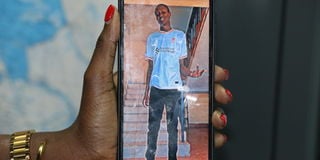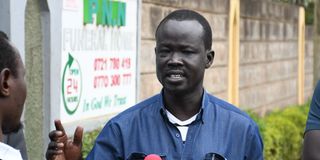“He left home to go fishing and never came back”: Family in shock after body of student is retrieved from Lake Nakuru

21-year-old Mach Mayien Anyieth, whose body was retrieved from Lake Nakuru on September 30, 2025.
On a sunny afternoon on September 26, 2025, 21 year old Mach Mayien Anyieth decided to go to Lake Nakuru with his friends to try and catch some fish.
This boyish expedition would unfortunately turn tragic, as it would be the last time that Mayien was seen alive before he drowned in the lake.
Mayien, a Form Three student and South Sudanese national living in Nakuru, had reportedly joined his friends at the lake despite restrictions on fishing imposed by the Kenya Wildlife Service (KWS). He never returned home.

Bol Ajak Atem, the South Sudanese community chairperson in Nakuru during an interview on September 30, 2025.
“People at home didn’t know where he was. His friends informed us that he was missing. Later, we were told that he had drowned in Lake Nakuru,” Bol Ajak Atem, the South Sudanese community chairperson says.
According to Mr Atem, Mr Mayien left home at around 7pm without telling his family where he was going. When he failed to return, his relatives filed a missing person report at Mwariki Police Station. Friends later confirmed that he had drowned while fishing at the lake.
On September 27 the day that Kenya Wildlife Service (KWS) opened the park for free entry, the family attempted to access the lake to search for him. Their request was initially denied.
“We asked to be allowed to enter the park to search for him, but we were refused and told to come back the next day. The next day, accompanied by police from Mwariki, we were permitted to retrieve the body,” explained Atem.
Despite their efforts, initial attempts to locate Mayien’s body were unsuccessful. It was not until 30 September that his body surfaced and was retrieved from the water.
“The body was moved to the PNN mortuary for preservation, and the family has positively identified the deceased,” says Atem, adding that they had left the matter to investigators.

The body of Mach Mayien Anyieth, 21, a South Sudanese national, is moved to PNN Mortuary on September 30, 2025 after being recovered from Lake Nakuru National Park.
This drowning incident comes just months after other troubling incidents at the same lake. In February 2025, the body of 24-year-old Justus Porokor was recovered from the lake, and the whereabouts of Brian Odhiambo, who disappeared inside the park in January, are still unknown.
For local leaders, Mayien’s death highlights the deeper challenges facing the community. Charles Odhiambo, chairperson of the Free Area Community Policing group, described Mayien as a hardworking young man who was trying to provide for his family.
“In this area, unemployment is very high. That is why young people go to the lake whenever they get the chance, hoping to earn a living,” Mr Odhiambo says.
He explains that the presence of young people at the lake had also helped to reduce crime in the area.
“For a long time, we struggled with insecurity, but since young men started going to the lake, crime rates have fallen. If game wardens and other security agencies stop them completely, I am afraid crime will return,” he warned.
Odhiambo criticised KWS for what he described as double standards in regulating access to the lake.
“Fishing at the lake to earn money is not a sin. If rangers don’t want people to fish there, they should block off access completely. As long as there are loopholes, people will still sneak in. Some people can enter and leave safely, while the less fortunate risk their lives,” he says.

